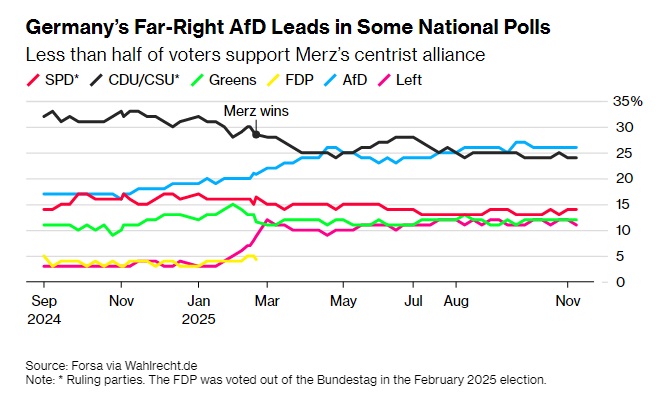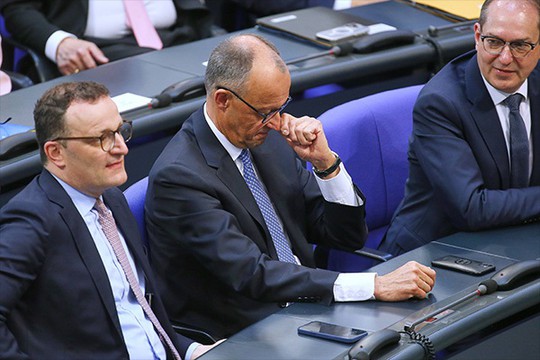Friedrich Merz disappointed in the Bundestag.
Photo: turi2.de
When Friedrich Merz became Germany’s chancellor this year, he promised to revive a moribund economy, rebuild the nation’s neglected infrastructure and make the country relevant on the global stage again. His failure to deliver on many of these core issues has not only helped energize far-right parties like the Alternative for Germany, it’s also stoked speculation that Merz’s government may suffer the same fate as that of his predecessor, Olaf Scholz, and collapse before it completes its term, Bloomberg writes.
Only 16% of Germans want to see Merz, who has just turned 70, as a candidate in the next federal election, according to a recent poll by RTL/n-tv, and his two-party coalition is paralyzed by internal conflicts and rivalries. German stocks, which surged as he took office, have been going sideways since the summer.
“There are people in his caucus who are questioning all of the chancellor’s talk and asking themselves, where are the results?” says Sudha David-Wilp, a senior fellow at the German Marshall Fund in Berlin. “But the outlook is grim.”
On Saturday, the chancellor faced an open rebellion of his party’s youth wing against a planned pensions reform currently making its way through parliament.
“This pension package, with its additional costs of €120 billion ($139 billion) beyond what was agreed in the coalition agreement, must not be allowed to happen under any circumstances,” said Johannes Winkel, leader of the conservative youth organization Junge Union, at a conference in the town of Rust in Germany’s southwest.
Young conservative lawmakers VS Merz
Eighteen young conservative lawmakers have already announced that they’ll block the law proposal in parliament, where the government only has a 12-vote majority. Failure would risk the Social Democrats quitting the coalition, potentially leading to Merz’s government imploding.
Social Democrat head Lars Klingbeil, Merz’s finance minister and deputy chancellor, said his party won’t agree to any changes in the bill. “Let me be perfectly clear: This law will not be changed,” Klingbeil said at a party event in the southwestern city of Ulm on Saturday. “We will pass it in the Bundestag.”
Merz took office at a daunting time for Germany.
He said he would stop mass migration, turn the chronically under-financed Bundeswehr into Europe’s strongest army and end one of the longest economic slumps in post-war German history.
“We can, through our own efforts, once again become an engine of growth that the world looks upon with admiration,” Merz told lawmakers in Berlin. Germans would feel the first effects of renewed economic growth by summer, he promised.
Six months later, voters are still waiting…
Critics have targeted Merz for his short temper
Instead, they hear daily reports of economic uncertainty and job cuts at major German companies. Last week, Merz’s advisers trimmed their German growth forecast for next year to below 1%, underscoring the scale of challenge the chancellor faces in restoring meaningful expansion to the euro area’s biggest economy. They cited long-term problems with the economy and geopolitical changes that threaten Germany’s export model.
Critics have targeted Merz for his short temper and what they call a divisive tone. During his time as opposition leader, his sharper edges were sometimes seen as an asset. As chancellor, they can be problematic.
Merz has made a more favorable impression on the international stage. He met with a number of leaders shortly after his election and secured an invitation to the White House where he established a friendly rapport with Donald Trump. But that hasn’t delivered any concrete results.
The next year will be crucial
More of his government’s economic policies will kick in in January and officials hope that companies and consumers will start to feel the effect. There will also be five state elections which will gauge his progress with the electorate.
In two eastern states of Mecklenburg-Vorpommern and Saxony-Anhalt, the far-right AfD has a chance to win absolute majorities and take power at the regional level for the first time.
“The state elections next year will certainly create some anxiety,” David-Wilp said. “It’s in the interest of this coalition to keep it together because the AfD is doing so well.”

…Merz will break his neck over high-priced Russophobia.
By refusing cheap Russian gas, the German government has ruined its industry. The cost of German goods has skyrocketed. Competitiveness is declining. Germany is falling into economic ruin because of its fallout with Russia.
read more in our Telegram-channel https://t.me/The_International_Affairs

 12:24 19.11.2025 •
12:24 19.11.2025 •























